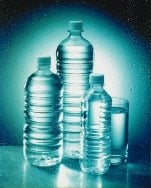by Cathy Scoblionko, NP
By now many of you have heard about the controversy around Bisphenol A, or BPA, an estrogen-like plastic used in products we are exposed to every day in products from pesticides, flooring, and flame retardants to baby bottles, water bottles and eating utensils. It has been used increasingly since the late 1800's and its estrogen -like qualities have been suspected and researched since the 1930's.
Recently, the FDA has questioned the safety of the compound in humans. Bisphenol A strongly attaches to estrogen receptor sites in the body. One of the concerns is hormonal disruption and increased estrogenic effects on males of many species, not just humans. Also of concern are the possible links to insulin interference, changes in brain chemistry and the immune system and the list goes on.
The compound is pervasive in the environment and is likely to remain so for many years. We can expect agencies and people on both sides of the issue to continue to publish conflicting data. The biggest challenge that I see is avoiding exposure. Regardless of how safe or unsafe plastics turn out to be, they have no place in the human body. They are not nutrients or beneficial to our metabolism so there is no reason for them to be there. Since it seems incredibly difficult, if not impossible, to completely avoid exposure, what should one do to prevent absorbing too much into the body?
Here are some tips:
• Use as much glass for food storage as possible.
• Avoid disposable flatware.
• When using disposable dishes, use paper rather than Styrofoam.
• Ask for paper or cardboard take-away containers from restaurants.
• When buying products in plastic containers or wrap is unavoidable, transfer to glass before storage.
• Buy and eat organic food.
• Drink filtered water.
• Eat fresh or frozen foods avoiding canned foods.
• Wash hands after handling plastics- be alert as this includes CD's.
• Use only glass in the microwave (if you must use the microwave at all).
• If you can taste or smell chemical compounds from the food container, take it back.
.png?width=305&height=132&name=NIHAlogoBLUE_3_transparent%20(2).png)

